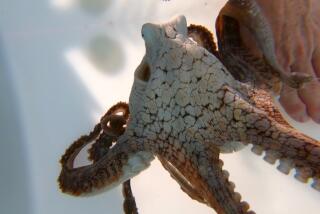Mexico Drops Shark Fishing Plan
MEXICO CITY — In an unusually public battle over Mexico’s extraordinary marine wealth, ecologists and tourism promoters have forced the government to scrap a new decree that would have allowed commercial shark fishing as close as half a mile offshore.
The surprise retreat, announced late Friday, gave environmentalists a victory in one of their biggest causes here in recent years. But it left largely unregulated an enterprise they say is threatening Mexico’s shark population and a host of marine species that sustain the country’s lucrative tourist industry.
Mexico requires commercial shark vessels to stay at least 50 miles from shore, but the rule is widely ignored. Opponents of the new decree said it was quietly promoted by Mexican entrepreneurs with ties to foreign fleet owners and would have legalized much of the poaching.
The dispute focused on Baja California and the adjacent 800-mile-long Sea of Cortes, home to more than 60 species of shark. Javier Usabiaga, the minister of agriculture and fisheries, says he favors more aggressive fishing there “to produce food for the hungry people of Mexico.”
But ecologists say the mile-wide gill nets and 6-mile-long lines dropped by shark boats are devastating one of the world’s richest collections of marlin, sailfish, dorado and other game fish populations, as well as manta rays, dolphins, endangered sea turtles and other non-game species.
Usabiaga’s ministry published the new decree July 12 after an unpublicized debate. The stormy reaction embarrassed President Vicente Fox, who was elected two years ago on a pledge to end the secretive, authoritarian ways that characterized seven decades of rule by his nemesis, the Institutional Revolutionary Party.
The Mexican leader, who championed the cause of “sustainable development” at a U.N. environmental summit in South Africa last month, never publicly endorsed the decree. Instead of putting it into force Sept. 12 as scheduled, he suspended it and called for public hearings on its possible revision.
From that point, the protesters got the upper hand. Fox’s environment and tourism ministers lined up against the decree, as did the federal Senate and state government of Baja California Sur, where game fishing is a mainstay of the tourist industry. Hotel owners there threatened a tax revolt.
“Mexico has changed radically,” Environment Minister Victor Lichtinger said in an interview. “You cannot do things like they used to, without the people really participating.”
A host of environmental activists registered their protests with full-page ads in Mexican newspapers and a torrent of e-mails to Fox’s office. They vowed to disrupt a late-October meeting of more than 20 world leaders, including President Bush, at the Asia-Pacific Economic Cooperation forum gathering in Cabo San Lucas, at the tip of the Baja peninsula.
Sports fishermen weighed in from abroad. “If this [decree] is passed, I will take all my fishing friends and their dollars to a different country that is sensible and protects their sports fishing stocks,” Peter Langstraat threatened in an electronic protest from the Netherlands. He said he and his group have been fishing in Baja California for 16 years.
In a sharp exchange in the Senate last Tuesday, Veronica Velasco, a senator and president of Mexico’s Green Party, glared at Usabiaga and demanded to know: “What private interests seek to benefit from this action?”
“Your servant does not respond to any private interests,” Usabiaga said, referring to himself in the third person. He went on to claim that critics kept silent during the internal debate on the decree, only to “create a scandal” after it was announced.
But in an unexpected reversal, Usabiaga told Congress he was ready to revoke the decree, “to take away, once and for all, the fear that we’re going to impose a rule at the cost of the country’s tranquillity.” The decree was formally abolished with a brief notice in Friday’s official government bulletin.
“These polemics show that when the people of Mexico become aware of a problem, they are in favor of conservation,” said Guillermo Alvarez, president of the Mexican Billfish Foundation.
“But the debate is just beginning,” he added. “The next step is to control the illegal fishing that’s going on” while the government tries again to draft regulations.
Carlos Villavicencio, a marine biologist in Baja California Sur, says the number of shark fishing permits from the government has grown from 57 in 1998 to 303 today and that during that time the annual catch has dropped from 34,000 tons to 22,000 tons because of overfishing.
Jeronimo Ramos, the top fisheries official in Usabiaga’s ministry, insists that sharks are not endangered. In an interview, he argued that the decree would have imposed enough regulation to sustain the shark population near its current level.
But ecologists and game fishing operators say their main concern is the loss of close-to-shore species caught up in shark poachers’ long lines and gill nets, then thrown away or left to die. Fisheries officials argue that such losses of “incidental fish” to shark boats and shrimp trawlers are not serious.
Last month, however, government prosecutors suggested otherwise. Backed by the navy, they began expelling shrimp trawlers that were fishing illegally in the federally protected Alto Golfo Biosphere Reserve, in the northern part of the Sea of Cortes, also known as the Gulf of California. On one boat, officials said, they confiscated 33 pounds of shrimp and 687 pounds of “incidental fish.”
*
Boudreaux reported from Mexico City and Thomas from Los Angeles.
More to Read
Sign up for Essential California
The most important California stories and recommendations in your inbox every morning.
You may occasionally receive promotional content from the Los Angeles Times.










